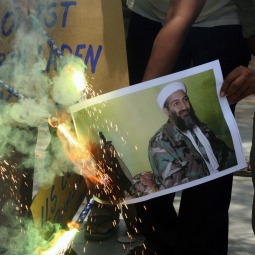Bin Laden’s Death Reignites Torture Debate
A Register analysis on what we can learn from an often contradictory discussion on Capitol Hill

WASHINGTON — The country was still reacting to the killing of Osama bin Laden when public attention was refocused on a long-simmering partisan debate with renewed intensity: Is the morality of torture ever justified, even if it helped to nail a terrorist mastermind?
We can surely express relief that bin Laden is no longer able to lead and inspire his global terror network without condoning the use of waterboarding — defined by some legal and military experts as “torture.” Pope Benedict XVI has stated that the prohibition against torture “cannot be contravened under any circumstances.”
But on Capitol Hill, the dueling camps that either endorse or repudiate the use of torture serve as a reminder of the ever-present temptation to tolerate immoral methods to achieve an end we deeply desire.
Whether we’re a pro-life congressman defending the utility of “enhanced interrogation techniques” or a pro-abortion president advocating strict adherence to the Geneva Convention, our political passions and attendant blind spots can lead us to articulate an incoherent defense of the dignity of human life.
No one is immune from the seductive power of employing illicit means for a desired end, and that’s why St. Paul’s injunction, “We cannot do evil that good may come of it” (see Romans 3:8) remains a central precept of natural law and Catholic moral doctrine.
Still, those blind spots can be hard to acknowledge. During a recent dinner party here in Washington, D.C., a high-credential, pro-life Catholic opined that tobacco stocks remained a great investment opportunity. He was surprised when a fellow guest questioned the morality of benefiting from tobacco profits, but was willing to agree that he would never invest in a company that made money in the pornography industry.
Our culture’s growing secularism has led many Americans to question the notion that some actions are always evil. And even when we resist this argument, we may find ourselves turning to a utilitarian “cost-benefit” formula as a place holder for moral precepts.
For example, opponents of embryonic stem-cell research will argue that this cutting-edge work still hasn’t produced a breakthrough cure and thus should be repudiated. We set aside our moral objections because we suspect that desperate patients and an empathetic public don’t really care about right and wrong.
So why should we be surprised that John Yoo — the Bush-era official in the Justice Department who wrote a series of 2002 directives justifying “enhanced interrogation techniques” — now contends that the killing of bin Laden “vindicates” the controversial policy?
“Sunday’s success also vindicates the Bush administration, whose intelligence architecture marked the path to bin Laden’s door. According to current and former administration officials, CIA interrogators gathered the initial information that ultimately led to bin Laden’s death. The United States located al Qaeda’s leader by learning the identity of a trusted courier from the tough interrogations of Khalid Sheikh Mohammed, the architect of the 9/11 attacks, and his successor, Abu Faraj al-Libi,” stated Yoo in a May 4 column for The Wall Street Journal.
The Obama administration, which initiated a criminal investigation of CIA agents involved in the harsh interrogation of terrorist detainees, has downplayed the role of waterboarding and other controversial methods.
Meanwhile, during the same week that U.S. Rep. Peter King, R-N.Y., chairman of the House Homeland Security Committee, defended waterboarding on Fox News as “the moral thing to do,” the GOP congressman voted with many of his peers to permanently ban federal funding of abortion and abortion coverage.
Arguing that waterboarding was not torture, King echoed Yoo’s position that “enhanced interrogation techniques” provided information that has saved lives and led to the capture and killing of terrorists.
Sen. Dianne Feinstein, the staunchly pro-abortion California Democrat who chairs the Senate Intelligence Committee, disputed King’s argument, and contended that no vital intelligence “came as a result of harsh interrogation practices.”
The same tangled thinking prevails at media outlets like The New York Times. The paper’s editorial page has characterized the effort to defund planned parenthood as a “war on women,” but yesterday the editors expressed their unequivocal opposition to torture, stating: “Even if it were true that some tidbit was blurted out by a prisoner while being tormented by CIA interrogators, that does not remotely justify Mr. Bush’s decision to violate the law and any acceptable moral standard.”
Of course, like all partisan battles in Washington, the passionate debate about the morality of torture that exploded in the wake of bin Laden’s killing is no academic exercise. Many on Capitol Hill view the debate as a way of settling scores, providing political cover, and offering some red meat to the political base on both sides of the aisle.
Yet, there is something we can all learn from Washington’s imperfect and often contradictory discussion about the morality of torture.
First, we might agree that some moral positions, like the prohibition against abortion, require a more urgent public defense. But our passion for defending unborn life should ultimately lead us to grapple with the broad spectrum of Catholic moral teachings — especially those that we may be most inclined to ignore out of self-interest, vice, or perhaps through a misplaced sense of patriotism. Grace sustains our struggle to embrace the fullness of the truth “that makes us free,” helping us to address the greatest personal challenges — the potential medical cure that requires our tolerance of a moral evil, the unplanned pregnancy amid poverty, the boss’s unethical demands.
This week, the killing of bin Laden tested our capacity to reverence human life, even the life of a despicable terrorist. There are and will always be further tests on our pilgrimage of faith. Catholics belong to a Church that is contra mundum.
Register senior editor Joan Frawley Desmond writes from Chevy Chase, Maryland.













